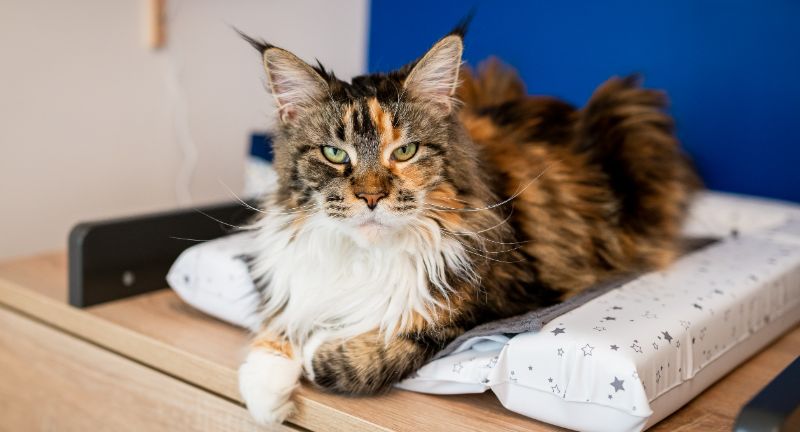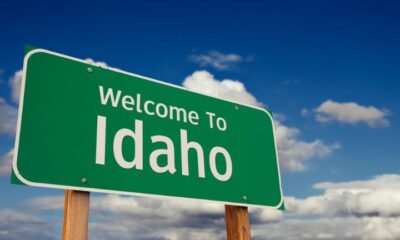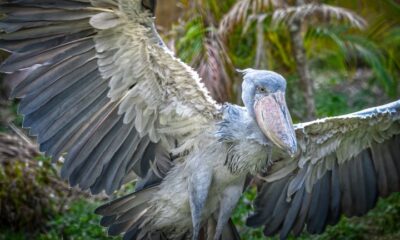NEWS
25 Major Challenges Of Caring For A Maine Coon
Published
1 month agoon

Shutterstock
Maine Coons are one of the most popular cat breeds, known for their large size, fluffy coats, and friendly nature. However, owning a Maine Coon comes with its own set of challenges that every potential owner should understand. From their grooming needs to their unique dietary requirements, these cats demand significant care and attention. In this article, we’ll explore major challenges of caring for a Maine Coon to help you determine if this majestic breed is right for you.
Grooming Requirements

Shutterstock
Maine Coons have long, thick fur that requires regular grooming to prevent tangles and matting. Brushing them at least two to three times a week is essential to maintain their coat’s health. Neglecting their grooming can lead to discomfort for the cat and potential health issues. Investing in quality grooming tools and being consistent with the routine is a must for Maine Coon owners.
Shedding

Shutterstock
Maine Coons are heavy shedders, especially during seasonal changes. Their fur can quickly accumulate on furniture, clothes, and floors, requiring frequent cleaning. For owners with allergies, this can become a significant challenge. Regular grooming and vacuuming are essential to manage the shedding effectively.
High Energy Levels

Shutterstock
Maine Coons are highly energetic and require plenty of playtime to stay happy and healthy. They thrive on interactive toys and games that challenge their minds and bodies. Without proper stimulation, they may develop destructive behaviors. Keeping up with their energy levels can be exhausting for some owners but is essential for their well-being.
Large Size

Shutterstock
Maine Coons are one of the largest domesticated cat breeds, with males often weighing over 18 pounds. Their size requires more space, larger litter boxes, and bigger scratching posts compared to smaller cats. Housing a Maine Coon in a small apartment can feel cramped for both the cat and the owner. Their large size also means they can unintentionally knock over objects or create a mess.
Cost of Food

Shutterstock
Due to their large size and active nature, Maine Coons require more food than the average cat. High-quality, protein-rich diets are crucial to meet their nutritional needs. This can result in higher monthly expenses for food compared to other cat breeds. Owners should be prepared for this ongoing cost to ensure their cat stays healthy and energetic.
Health Issues

Shutterstock
Maine Coons are prone to certain genetic health conditions, such as hip dysplasia and hypertrophic cardiomyopathy (HCM). Regular veterinary check-ups and preventative care are crucial to managing their health. These medical needs can lead to higher veterinary bills over the course of their life. Understanding the potential health risks is essential before committing to this breed.
Territorial Behavior

Shutterstock
Maine Coons can sometimes exhibit territorial behaviors, especially if they feel their space is being invaded. This can be challenging in multi-pet households or with frequent visitors. Proper socialization and gradual introductions to other animals are crucial to minimizing these issues. Owners must be patient and willing to mediate conflicts to maintain a peaceful home environment.
Need for Mental Stimulation

Shutterstock
Maine Coons are highly intelligent and need plenty of mental stimulation to stay happy. Without engaging toys or puzzles, they may become bored and destructive. Providing activities like interactive feeders or teaching them tricks can keep their minds sharp. Regular playtime is essential to prevent behavioral problems caused by boredom.
Expensive Veterinary Care

Shutterstock
Maine Coons often require specialized veterinary care due to their predisposition to certain health conditions. Regular screenings for heart issues and joint problems can add to medical expenses. Pet insurance can help offset some costs, but it’s still a significant financial responsibility. Owners should budget for both routine and emergency care when considering this breed.
High Cost of Ownership

Shutterstock
From grooming tools to food and veterinary bills, owning a Maine Coon can be costly. These expenses can quickly add up, especially if the cat develops health issues. Adopting from a reputable breeder or shelter may also require a substantial initial investment. Potential owners should be financially prepared to support their Maine Coon’s needs throughout its life.
Lifespan and Commitment

Shutterstock
Maine Coons can live up to 15 years or more, requiring a long-term commitment from their owners. This extended lifespan means providing care through all life stages, from energetic kittenhood to senior years. Owners must plan for changes in the cat’s needs as it ages, including dietary adjustments and increased veterinary care. Commitment to their well-being is essential for their happiness and health.
Susceptibility to Obesity

Shutterstock
Maine Coons are prone to weight gain if not properly exercised or fed a balanced diet. Their love for food can lead to overeating, causing health issues such as diabetes and joint stress. Owners need to monitor their cat’s weight and provide portion-controlled meals. Regular play and activity are also critical to keeping them fit and healthy.
Vocal Nature

Shutterstock
Maine Coons are known for their vocalizations, including chirps and trills. While many owners find their sounds endearing, others may find it overwhelming, especially in quieter households. Their vocal nature often indicates a desire for attention or interaction. Understanding their communication style is essential to fostering a positive relationship.
Allergies

Shutterstock
Despite their luxurious coats, Maine Coons are not hypoallergenic and can trigger allergies in sensitive individuals. Their shedding and dander can be problematic for those with respiratory sensitivities. Frequent grooming and cleaning can help reduce allergens in the home. Potential owners with allergies should consider this carefully before adopting.
Difficulty Finding a Reputable Breeder

Shutterstock
Finding a reputable Maine Coon breeder can be a challenge due to the breed’s popularity. Unscrupulous breeders may not follow ethical practices, resulting in cats with health or behavioral issues. Potential owners need to research thoroughly and ask for health guarantees and certifications. Adopting from a shelter or rescue organization can be a better alternative for those who want to avoid breeders altogether.
Risk of Separation Anxiety

Shutterstock
Maine Coons are highly social cats that can develop separation anxiety if left alone for long periods. They thrive on human interaction and may become stressed or destructive when isolated. Owners with demanding schedules may need to consider hiring a pet sitter or adopting a companion animal. Providing enrichment activities can also help alleviate anxiety during absences.
Adaptation to Other Pets

Shutterstock
While Maine Coons are generally friendly, introducing them to other pets can sometimes be tricky. Their large size and playful nature may intimidate smaller animals. Gradual introductions and careful monitoring are essential to ensure a harmonious relationship. Patience and positive reinforcement can help foster compatibility between the Maine Coon and other pets in the household.
Expensive Toys and Accessories

Shutterstock
Maine Coons require durable and high-quality toys and accessories due to their size and strength. Standard cat toys may not withstand their playful nature, leading to frequent replacements. Larger scratching posts, beds, and carriers designed for big cats can be quite expensive. Investing in long-lasting products can save money in the long run while keeping your cat entertained and comfortable.
Long Adjustment Period

Shutterstock
Maine Coons can take time to adjust to new environments, especially if they are rehomed as adults. They may exhibit shy or cautious behavior until they feel secure. Creating a quiet and comfortable space for them during the transition can help ease their anxiety. Building trust requires patience and consistent positive interactions from their new owners.
Vocal Demand for Attention

Shutterstock
Maine Coons are not shy about demanding attention from their owners. They often use their vocalizations to express needs, such as playtime or affection. While endearing to some, this behavior can be overwhelming for owners who prefer quieter pets. Ensuring regular interaction and meeting their needs can help reduce excessive vocal demands.
Challenging Training Sessions

Shutterstock
Training a Maine Coon can be both rewarding and challenging due to their independent nature. While intelligent, they may sometimes choose to ignore commands, especially if not motivated. Using positive reinforcement with treats or playtime can make training sessions more successful. Consistency and patience are key to teaching them new behaviors or tricks.
Scratching Habits

Shutterstock
Maine Coons love to scratch, which can result in damaged furniture if not properly managed. Providing sturdy scratching posts or pads is essential to redirect this behavior. Cats that are not trained to use these alternatives may continue to scratch inappropriate surfaces. Regularly trimming their claws can also help minimize damage around the house.
High Water Affinity

Shutterstock
Maine Coons are unique among cats for their love of water. While this can be amusing, it can also lead to frequent messes around water bowls or sinks. They may even try to join you during a shower or bath. Owners should be prepared for their water fascination and take precautions to prevent accidents.
Demand for Outdoor Space

Shutterstock
Maine Coons enjoy exploring and may thrive in homes with safe outdoor spaces. However, letting them roam freely outdoors can expose them to risks like predators or accidents. A secure outdoor enclosure or leash training can provide a safe alternative. Meeting their curiosity for the outdoors helps keep them mentally and physically stimulated.
Long-Term Emotional Investment

Shutterstock
Maine Coons form deep bonds with their owners and thrive on love and attention. This emotional connection requires a long-term investment in their happiness and well-being. Owners must be prepared to devote time and effort to nurturing this bond throughout the cat’s life. In return, Maine Coons provide unmatched loyalty and companionship.
Conclusion

Shutterstock
Owning a Maine Coon can be incredibly rewarding, but it comes with unique challenges that require dedication and effort. From their grooming and dietary needs to their high energy levels and potential health concerns, Maine Coons demand a significant commitment from their owners. However, with proper care and attention, these majestic cats can bring immense joy and companionship. Before adopting a Maine Coon, ensure you are prepared to meet their specific needs and provide them with a loving and supportive home.
Related Topics:

More From Lifestylogy
-


21 Warning Signs Your Teen May Be Struggling with Their…
-


22 State Laws That Are Hard To Believe They Actually…
-


23 Mysterious Creatures That Give Cryptozoology Credibility
-


23 Crucial Items Often Overlooked In Wills—Don’t Miss These
-


21 Mistakes to Avoid Immediately After Botox
-


25 Fresh Whole Food Tips To Tackle Diabetes—No Meds, Just…
-


25 Things In Your Home That Guests Might Secretly Judge
-


23 Cars So Reliable Drivers Keep Them for Over A…
-


Beware: These 12 Popular Foods Could Wreck Your Cholesterol Levels